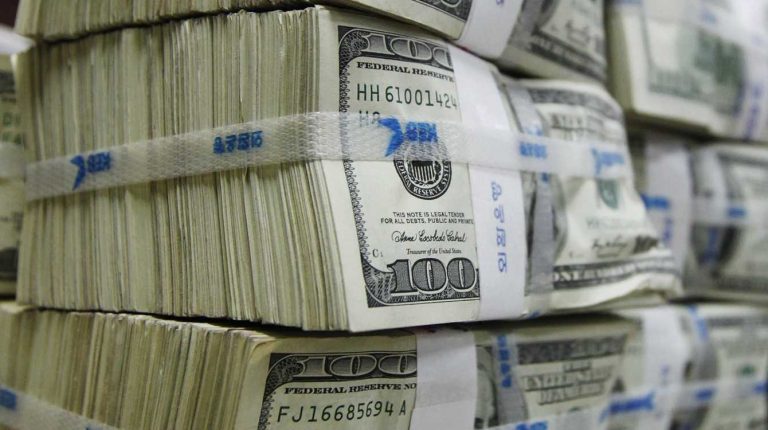The Nigerian external reserves have recorded a whopping sum of $32.16billion as at September 22, 2017, indicating a total gain of $7.41bn in the last 12 months, statistics obtained from the Central Bank of Nigeria (CBN) has revealed.
The latest apex bank’s statistic showed that as at September 22, 2016, the external reserves stood at $24.75bn, against the current $32.16bn, hence, this represents an appreciation of over seven billion dollar in just one year.
However, the reserves figure was seen at $31.8bn a month ago, exactly August 28, 2017, but strengthened by $361.6million within one month to record new figure of $32.16bn, thus, representing the highest balance since January 2015.
Although, the external reserves have staged a rebound since early 2017 after hitting a post- election low of about $23.6bn back in October 31, 2016 (using adjusted data); the external reserves dropped below $30bn in February, 2015, just before the 2015 General Election.
Since then, it’s been downhill, as Nigeria grappled with a combination of drops in crude oil prices, incessant militant attacks; and massive capital flight.
This triggered two devaluation of the naira and a return to capital controls by the CBN, led by Godwin Emefiele. However, as agitations grew locally and abroad, the CBN eventually introduced a flexible exchange rate policy that was eventually jettisoned shortly after.
This sent the reserves to below $25bn; and the exchange rate at the black market hitting record lows. However, improvements were being noticed, as OPEC members agreed to an output cut that excluded Nigeria and Libya.
Nigeria also changed its Niger Delta strategy, preferring dialogue to vile threats. As attacks dissipated and OPEC cuts came into enforcement, crude oil output rose and exports increased leading to a rise in Nigeria’s external reserves.
Although the apex bank did not mention reason (s) for increased external reserves, but the growth tend to come from increased global oil prices and inflow from International Money Transfer Operations.
The price of Organisation of Exporting Countries (OPEC) basket of 14 crudes countries stood at $56.43 per barrel per day on Tuesday, but rose slightly on Wednesday, to $58 bp/d. Hitting $32bn, the highest in 2017, the external reserves have gained $6.3bn or 24 per cent from $25.8bn it opened this year; and it has gained 1.05 per cent as at September 21, 2017.
Between January and August, the foreign exchange buffer of the CBN appreciated by estimated $5.97bn from $25.8bn it opened this year despite CBN’s unrelenting intervention in the foreign exchange market.
Experts had said steady increase in global oil prices continued to impact on CBN’s foreign exchange buffer and the nation’s economy at large. CBN spokesman, Mr. Isaac Okorafor, had noted the increase in external reserves can be attributable to peace in the oil-rich Niger-Delta region of the country, which resulted into increased oil output and earnings.
The increase in external reserves have continued to impact on the CBN’s weekly intervention to manufacturing sector, Small and Medium Scale Enterprises’ (SMEs’) sector, and others that leverage on the nation’s economy out of recession, data from the National Bureau of Statistics (NBS) had disclosed.
The data from NBS showed that the economy expanded by 0.55 per cent in the second quarter (Q2) of 2017, driven mainly by the performance of the oil, manufacturing, agriculture and trade sectors. Okorafor said with the sustained interventions, the apex bank has been able to push foreign exchange demand away from the parallel market into the formal regulated market.
OPEC and other producers, including Russia, have promised to restrict output by 1.8 million bp/d until March 2018 to help support prices and draw down inventories.
The CBN had disclosed that external reserves appreciated by $554.7 million or 1.8 per cent in July when it closed July at $30.8 billion from $30.29 billion it opened the month under review.
The $30.8 billion foreign reserve reordered by CBN was the highest since May 12, 2017. The external reserves appreciated by $4.45 billion in the first quarter (Q1) of 2017 amid CBN sustained pressure in bridging the gap between official foreign exchange and parallel market rates with the introduction of several foreign exchange windows.
Statistics on the CBN website revealed that the external reserves increased by 17.2per cent to $30.29 billion on March 30, 2016 from $25.84 billion it opened this year.
Specifically, the external reserves for the first time in 2017 hit $30 billion on March 8 and hovering around $29 billion and $28 billion in February. OPEC price basket of 14 crudes had closed at $50.04 a barrel in March.
The Federal Government 2017 budget was based on the production of 2.2 million barrels per day at the reference price of $42.5 per barrel in the global market, a benchmark the executive used in preparing the budget.




